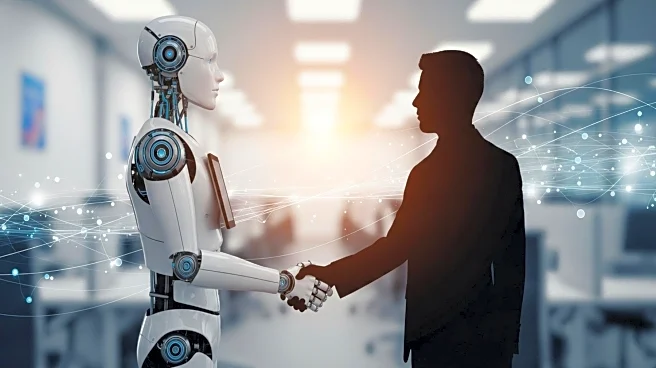What is the story about?
What's Happening?
The call center industry is undergoing significant changes with the integration of artificial intelligence (AI). Companies are deploying AI systems to handle routine customer service tasks, aiming to improve efficiency and reduce costs. OpenAI's 'ChatGPT Agent' is one such service designed to understand complex customer requests. Despite these advancements, human agents remain crucial for handling complex issues. The industry faces challenges such as high employee turnover due to stress and monotonous work. Some companies, like Klarna, have experimented with replacing human agents with AI, but found that human intervention is still necessary for certain tasks, such as identity theft issues.
Why It's Important?
The integration of AI in call centers has the potential to transform the industry by automating routine tasks, thereby reducing operational costs and improving customer service efficiency. However, the reliance on AI raises concerns about job losses and the need for skilled human agents to manage complex customer interactions. The shift towards AI-first contact centers could lead to a demand for better-trained human agents, potentially improving job quality and pay. The introduction of legislation like the 'Keep Call Centers in America Act' highlights the importance of maintaining human involvement in customer service and supporting domestic job retention.
What's Next?
As AI continues to evolve, call centers may increasingly rely on AI for routine tasks while human agents focus on complex issues. Companies might invest in training programs to enhance the skills of human agents, ensuring they can effectively collaborate with AI systems. The industry could see further legislative efforts to balance AI integration with job preservation. Stakeholders, including businesses and policymakers, will need to address ethical considerations and the impact of AI on employment.
Beyond the Headlines
The ethical implications of AI in call centers include concerns about privacy, data security, and the potential for bias in AI decision-making. The cultural shift towards AI-first contact centers may influence customer expectations and satisfaction. Long-term, the industry might experience a redefinition of job roles, with human agents becoming more specialized and focused on problem-solving rather than routine tasks.















